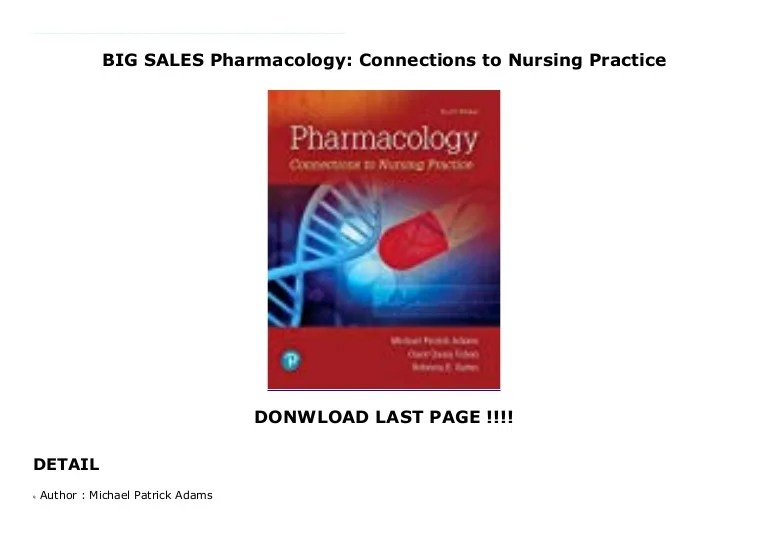Pharmacology connections to nursing practice 5th edition – Welcome to the world of pharmacology connections to nursing practice, as explored in the 5th edition of this comprehensive guide. This edition delves into the intricate relationship between pharmacology and nursing, providing a solid foundation for nurses to excel in medication management and optimize patient outcomes.
Throughout this guide, we will navigate the principles of pharmacokinetics and pharmacodynamics, delve into drug classifications and their mechanisms of action, and explore the various routes of drug administration and their implications. We will also examine adverse drug reactions and interactions, ensuring nurses are well-equipped to manage potential complications.
Introduction to Pharmacology for Nurses: Pharmacology Connections To Nursing Practice 5th Edition

Pharmacology is the study of drugs and their effects on living organisms. It is an essential component of nursing practice, as nurses are responsible for administering medications and monitoring their effects on patients.
Nurses play a vital role in medication management, including:
- Assessing patients’ medication needs
- Administering medications safely and effectively
- Monitoring patients for adverse drug reactions
- Educating patients about their medications
Pharmacokinetics and Pharmacodynamics, Pharmacology connections to nursing practice 5th edition
Pharmacokinetics is the study of how drugs are absorbed, distributed, metabolized, and excreted by the body. Pharmacodynamics is the study of how drugs interact with the body to produce their effects.
Understanding pharmacokinetics and pharmacodynamics is essential for nurses to be able to safely and effectively administer medications.
Drug Classifications and Actions
Drugs are classified into different categories based on their therapeutic effects. Some common drug classifications include:
- Antibiotics
- Analgesics
- Antidepressants
- Antihypertensives
- Anticoagulants
Nurses need to be familiar with the different drug classifications and their mechanisms of action in order to be able to administer them safely and effectively.
Drug Administration and Monitoring
Nurses are responsible for administering medications via a variety of routes, including oral, intravenous, intramuscular, and subcutaneous. Each route of administration has its own advantages and disadvantages.
Nurses must also monitor patients for adverse drug reactions. Adverse drug reactions can range from mild to severe, and they can occur at any time during drug therapy.
Adverse Drug Reactions and Interactions
Adverse drug reactions are a common problem, and they can be caused by a variety of factors, including:
- Drug interactions
- Patient allergies
- Overdosage
- Underlying medical conditions
Nurses need to be able to identify and manage adverse drug reactions in order to ensure patient safety.
Pharmacology in Specific Nursing Specialties
Pharmacology is an essential component of nursing practice in all specialties. However, there are some unique pharmacology considerations in different nursing specialties, such as:
- Critical care
- Pediatrics
- Geriatrics
Nurses in these specialties need to be familiar with the specific pharmacology considerations that apply to their patients.
Legal and Ethical Aspects of Pharmacology
Nurses have a legal and ethical responsibility to administer medications safely and effectively. This includes obtaining patient consent, following medication orders, and monitoring patients for adverse drug reactions.
Nurses must also be aware of the ethical implications of medication administration, such as the patient’s right to refuse treatment.
Evidence-Based Practice in Pharmacology
Evidence-based practice is an essential component of nursing practice, including pharmacology. Nurses need to stay up-to-date on the latest pharmacological advancements in order to provide the best possible care to their patients.
There are a number of ways that nurses can stay up-to-date on the latest pharmacological advancements, including:
- Reading professional journals
- Attending conferences
- Taking continuing education courses
Essential Questionnaire
What is the significance of pharmacology in nursing practice?
Pharmacology provides nurses with the knowledge and skills to safely and effectively administer medications, ensuring optimal patient outcomes.
How do pharmacokinetics and pharmacodynamics influence drug effects?
Pharmacokinetics describes how the body handles a drug, while pharmacodynamics explains how the drug interacts with the body. Understanding these principles is crucial for predicting and managing drug effects.
What are some common adverse drug reactions?
Common adverse drug reactions include nausea, vomiting, diarrhea, rash, and headache. Nurses must be vigilant in monitoring for and managing these reactions.